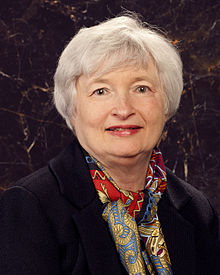The Federal Reserve's top regulator said on Tuesday that the U.S. central bank should not rule out using monetary policy to combat asset price bubbles that potentially threaten financial stability.
Weighing into a long-standing debate, Fed Governor Daniel Tarullo, the central bank's point person on financial supervision, said regulatory tools might not be enough on their own to prevent the formation of economically damaging bubbles.
.jpg) |
| Daniel Tarullo |
"In reviewing the relationship between financial stability considerations and monetary policy ... monetary policy action cannot be taken off the table as a response to the build-up of broad and sustained systemic risk," Tarullo, who has a permanent vote on monetary policy but rarely talks publicly about it, told the National Association for Business Economics.
More than five years of near-zero Fed interest rates and trillions of dollars in asset purchases have raised concerns that the central bank may need to tighten policy before achieving its economic goal of preventing asset bubbles.
Tarullo said that while investors are taking on more risks in high-yield corporate bonds and leveraged loans, for example, there was no need to change monetary policy at the moment.
But he urged the Fed to establish a better framework to judge trade-offs between enhancing financial stability and reducing economic activity, before risks grew more urgent.
Incorporating such considerations into policy decisions does not require a new, formal mandate in addition to the Fed's congressionally-set goals of price stability and sustainable low unemployment, Tarullo added.
At a policy-setting meeting last month, "several" Fed officials suggested that financial-market risks, such as asset-price bubbles, should be an explicit consideration as they consider when to finally raise rates.
MORE WORK ON REGULATION
Five years after the collapse of Lehman Brothers, regulators need to do more to ensure the biggest U.S.-based banks are safe and taxpayers are protected from costly bailouts, Tarullo said.
"I don't think that we're at, or even really close to, the point at which we can say, 'Okay, now we can be pretty comfortable that along the spectrum of concerns we've come far enough that we're hitting about the right trade-off.'"
An unsustainable build-up of leverage in mortgage assets on Wall Street sparked the 2007-2009 financial crisis. A flurry of subsequent rule-making is meant to reinforce the financial system, but some worry that the Fed's unprecedented easy-money policies could fuel another damaging bubble.
"While ad hoc supervisory action aimed at specific lending or risks is surely a useful tool, it has its limitations," Tarullo said, citing the "strong inflows" in the corporate bonds and leveraged loans that raise "the possibility of large losses going forward."
He said the Fed is closely watching the risks posed by its easy monetary policies "particularly given the possibility that interest rates may remain historically low for some time even after" policymakers begin to raise them.
"Our monitoring does find some evidence of increased duration and credit risk, but the increases appear relatively moderate to date - particularly at the largest banks and life insurers," he said.
Based on published forecasts, the central bank plans to halt its bond-buying later this year and start to raise rates some time in 2015, as long as the economy continues to expand and unemployment continues to drift lower.
Reuters

.jpg)









